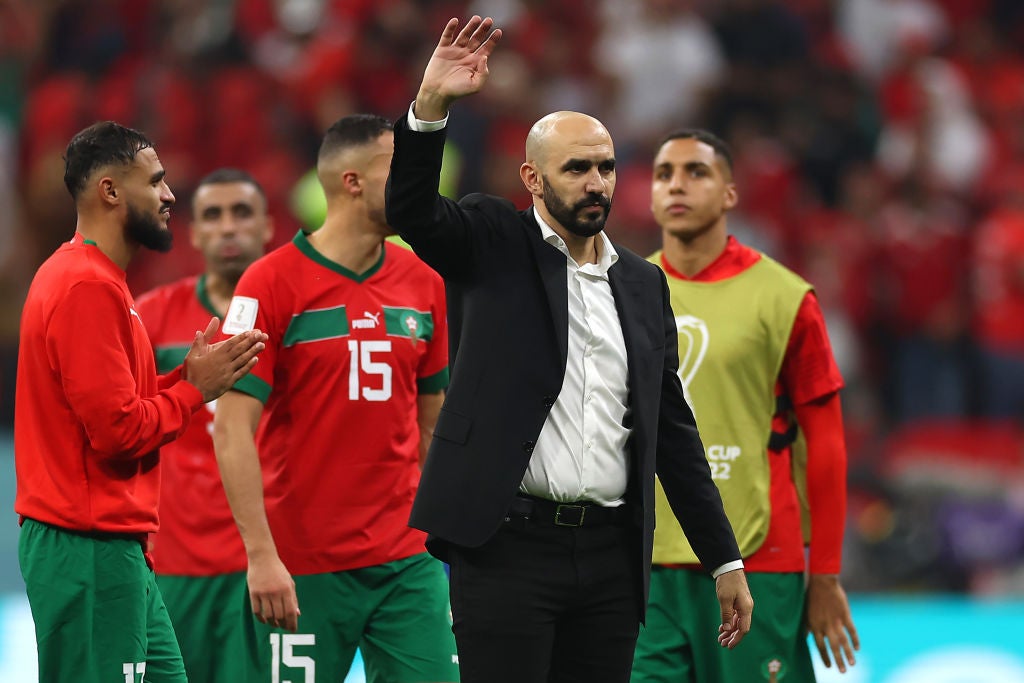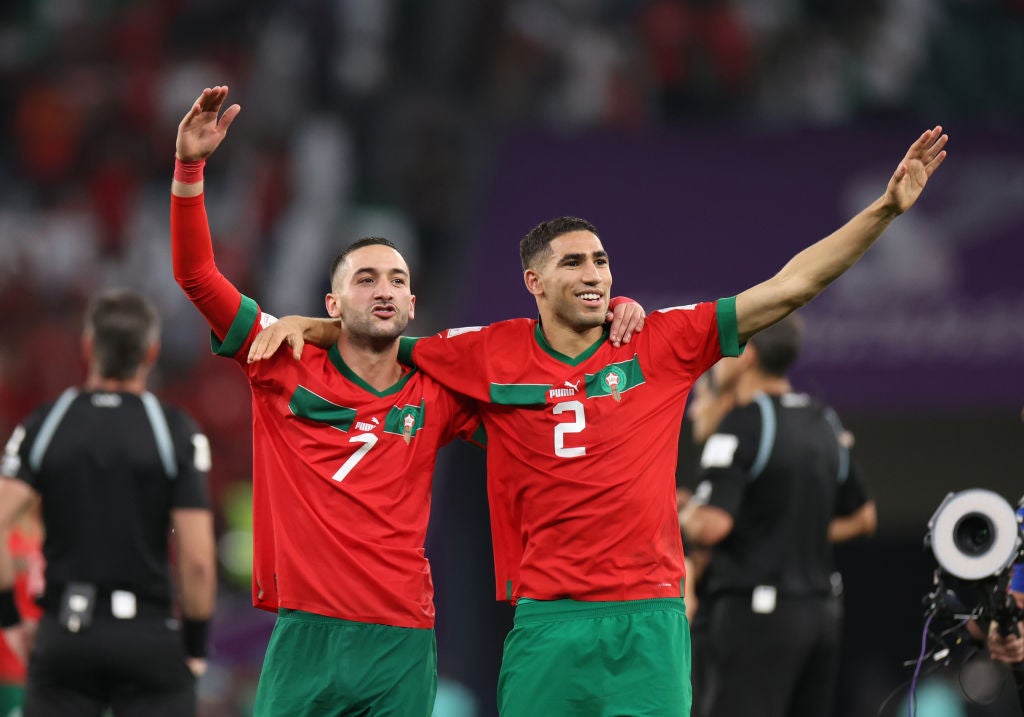Morocco dream of reaching even greater heights after historic World Cup run
Walid Regragui’s side finished fourth in Qatar and want their achivement to be a stepping stone to further success

Your support helps us to tell the story
From reproductive rights to climate change to Big Tech, The Independent is on the ground when the story is developing. Whether it's investigating the financials of Elon Musk's pro-Trump PAC or producing our latest documentary, 'The A Word', which shines a light on the American women fighting for reproductive rights, we know how important it is to parse out the facts from the messaging.
At such a critical moment in US history, we need reporters on the ground. Your donation allows us to keep sending journalists to speak to both sides of the story.
The Independent is trusted by Americans across the entire political spectrum. And unlike many other quality news outlets, we choose not to lock Americans out of our reporting and analysis with paywalls. We believe quality journalism should be available to everyone, paid for by those who can afford it.
Your support makes all the difference.It is 88 years since an African team first entered the World Cup and Walid Regragui had sailed into territory none of the previous 48 had ever charted. And yet, when it was put to the Morocco manager that Africa’s maiden semi-finalists are his continent’s greatest ever team, he demurred. Not yet, said the ever demanding Regragui.
Instead this most ambitious of managers has a new aim. Morocco had played three World Cup matches in the 21st century before he led them into seven. They have not won the African Cup of Nations since 1976, the year after Regragui’s birth. That is his new target.
“I think we are one of the best African generations because we reached the semi-final but I said to the players, if you want to go down in history, you have to win the African Cup of Nations,” he said. “If we can do that then we will show we are the best generation. Before being king of the world, you need to be king in your own country so we need to dominate our continent.”
In a sense, even as Morocco finished fourth, Regragui has been the king of the World Cup. He has been the manager of it, and the motivational speaker as well. He has been the most charismatic coach and the champion of a continent. He is the man who has encouraged them to dream. If he gets his way, Morocco’s achievement in reaching the last four will be a stepping stone.
“Morocco have shown African teams can go toe to toe with European teams,” he said. “We played against some of the footballing powerhouses of the world. We are now one of the top four teams in the world and if you had told me that before the World Cup and that Morocco would be No. 4, I would have accepted that straight away.”
The context underlined why. Morocco’s first two games were against Croatia and Belgium, two of the top three teams in the last World Cup. They could have been out before they even faced Canada. Regragui, parachuted into the job in August, might have been an afterthought in accounts of this World Cup. Instead, he became one of its most compelling characters.
“The doubts were in the minds of everybody before this tournament about Africa and the Arab world,” he said. “We have gone further than expected but it is not enough, That needs to set the example for the future, whether it is Morocco or another African team.”
Regragui’s aim for the future is suitably bold. “We have an objective of winning the World Cup one day,” he said. And if, a month ago, that might have seemed utterly implausible, now it merely appears unlikely. “We had a 0.01 percent of winning this World Cup at the outset and we managed to get through to the last four,” he said. And if Morocco were priced at 200/1, giving them a 0.5 percent chance, it still represents an extraordinary achievement.

In his seminal 2022, a third fine feat, after winning the Moroccan title and then the African Champions League with Wydad AC, feels the greatest. He has put Morocco on the map: literally in the case of the Club World Cup, which it will host in February. After five bids to stage the World Cup, often seemingly not taken seriously, Morocco have a sudden prominence. Ragregui’s reign is still not four months old and it is already transformative.
The immediate question is how much more he can achieve, whether his ability to upset European sides can translate to conquering Africa in international football, as he did in the club game. If a core of his trailblazing team are in their late twenties or early thirties, in captain Romain Saiss, goalkeeper Bono, centre-back Jawad El Yamiq and wingers Hakim Ziyech and Sofiane Boufal, most could be around for much of the next four-year cycle. In Sofyan Amrabat, Achraf Hakimi, Noussair Mazrouai, Nayef Aguerd, Selim Amallah and Youssef En-Nesyri, there are elite performers in their mid-twenties. In the breakout star Azzedine Ounahi, there is a still younger talisman and a hint that Morocco and its diaspora possess other untapped talents.

Regragui has set Morocco a goal of always qualifying for the World Cup knockout phase; that the African contingent will go up from five to nine in 2026 helps. “What we want now is to get through the group stage every time and one day we will win the World Cup,” he said. A reason Croatia beat Morocco, he feels, was their greater experience. “We want to give our children the footballing DNA,” he said. “You build that DNA gradually so that one day a team that can achieve the dream of all Africans.”
His legacy is as part builder, part dreamer. “For me, football makes people dream and children in particular,” he explained. “In Morocco and Africa, we have kept those dreams alive. It means more than a victory at the World Cup.” But his side came two games from the greatest World Cup win of all. Now he has turned his attentions to the African Cup of Nations. The rest of Africa should beware.



Join our commenting forum
Join thought-provoking conversations, follow other Independent readers and see their replies
Comments